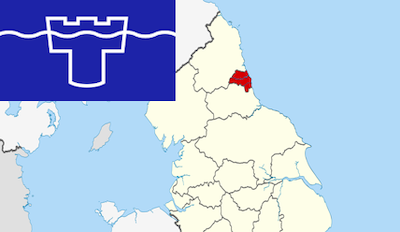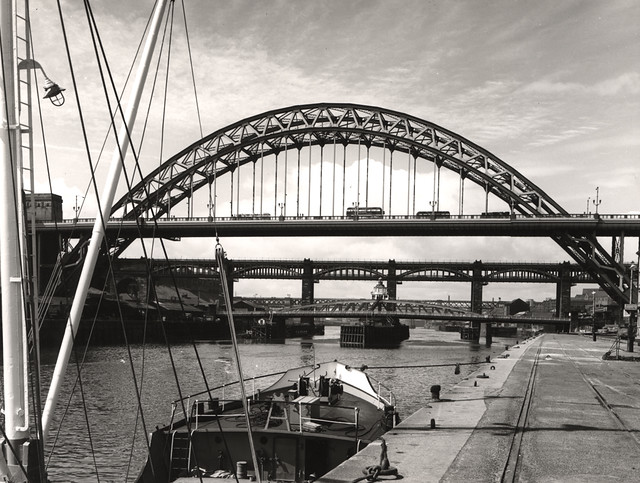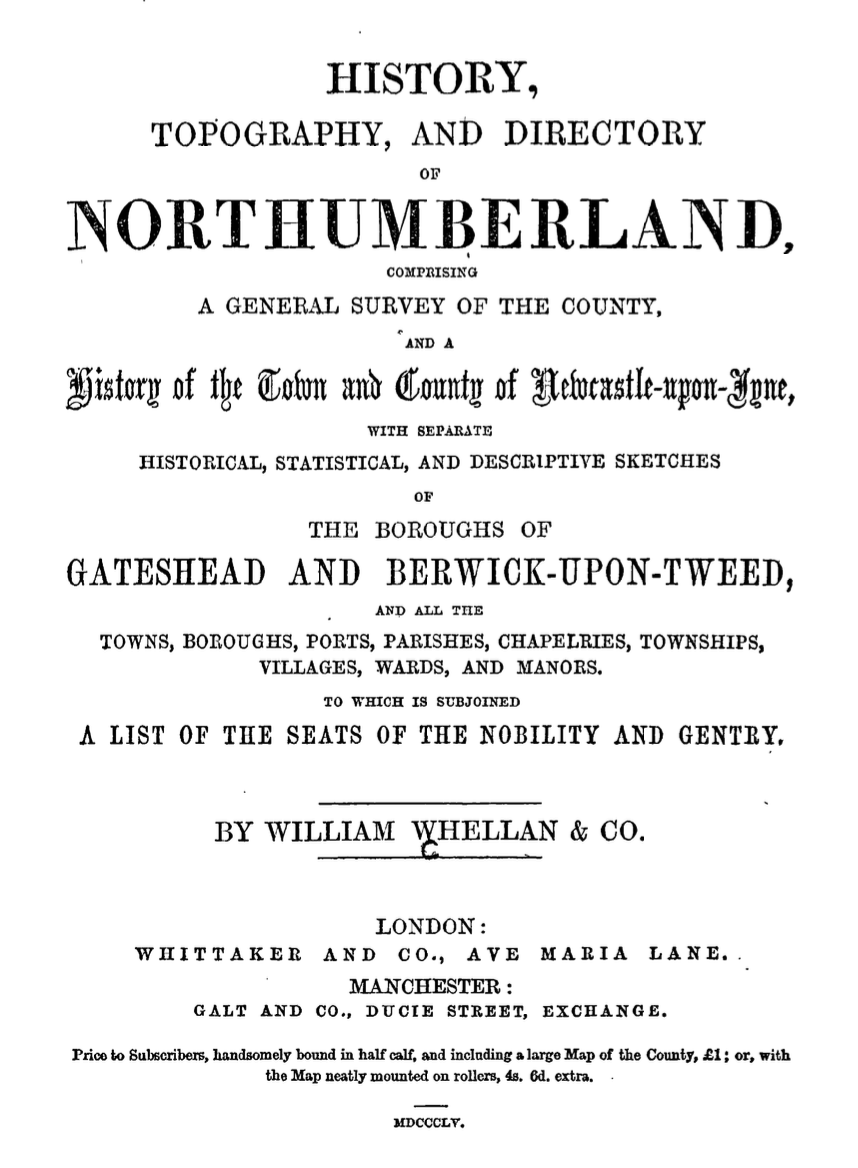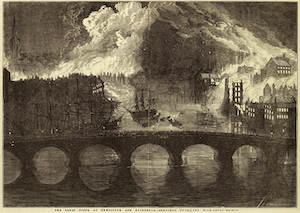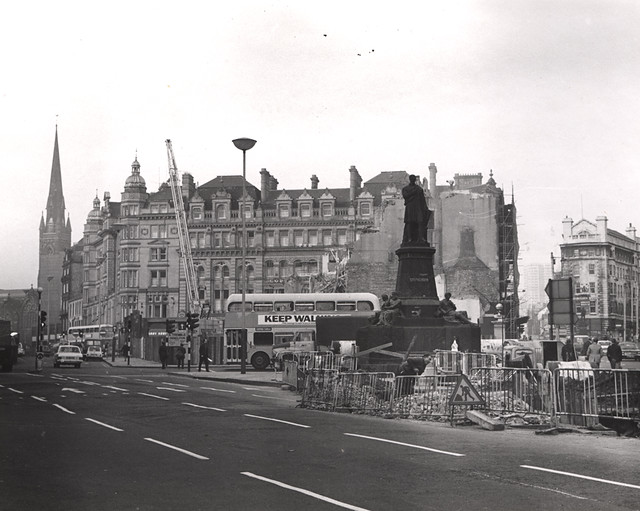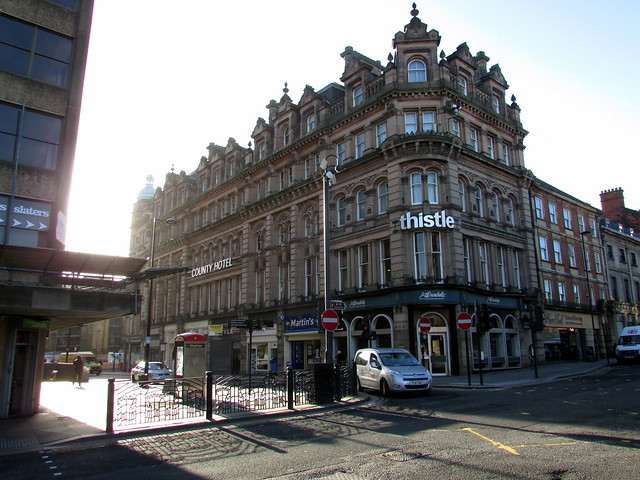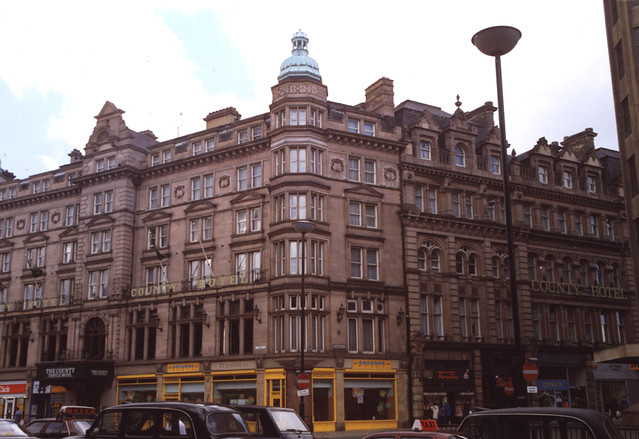Topics > Tyne and Wear > Newcastle upon Tyne > Newcastle, 1855 > Fire of Newcastle & Gateshead (1854)
Fire of Newcastle & Gateshead (1854)
Extract from: History, Topography, and Directory of Northumberland...Whellan, William, & Co, 1855.
Since the above pages were written, a new and melancholy interest, a deep tragic interest, has been given to the sister towns of Newcastle and Gateshead, by events which have recently occurred. A little after midnight, on the morning of the 6th of October of the present year (1854), a fire broke out on the premises of a worsted factory, on the Gateshead side of the river. Like most buildings in which extensive machinery is planted upon wooden floors, this factory might be said to be steeped in oil, and it was therefore presently one body of fire. The flames spread to a contiguous building at the foot of Hillgate, in which great quantities of sulphur had been stored. It came out in torrents, like streams of lava, and, as it met the external air, began to burn, and its combustion illuminated the river and its shipping, the Tyne Bridge, the High Level Bridge, and the church steeples of Newcastle, spreading over every object its lurid and purple light. The neighbouring warehouses were now enveloped in flames, and from their various floors huge masses of melted tallow and lead flowed in copious streams. Large numbers of persons were everywhere engaged in endeavouring to arrest the progress of the destructive element, and as the flames reached the bonded warehouse their activity and anxiety were redoubled. A detachment of military, fifty strong, hastened down, with their barrack engine to assist those already at work, and other aid was telegraphed for. A slight concussion warned the gathering crowd that there was something more perilous than sulphur in the burning pile, but it was naturally supposed that with the shock the danger had ceased. A few minutes later, and the misinterpreted warning received a terrible fulfilment. The air was rent as with the voice of many thunders, and filled as if with the spume of a volcano. The rocky bases of Tyneside trembled, the High Level Bridge shook like a piece of thin wire, and the surface of the river was agitated as if by a violent storm. At towns twelve miles off, and even twenty miles at sea, the vibration was felt. Massive walls were crumpled into heaps, blocks of houses tumbled into ruin, windows shattered from their frames far and near, and a shower of burning timbers and crashing stones rained terror, death, and fresh destruction on every side. Of the fifty soldiers advancing with their engine, they were struck down - two of them dead, and one with an iron rail driven into his body. Firemen and helping citizens were crushed where they stood. Some, looking on in helpless excitement, were in a moment stricken beyond consciousness. Some perished under their own roofs, while others fell beneath the descending fragments.
A battle field could not have yielded a more horrible tragedy. Limbs were torn away, bones fractured, lumps of wood forced into the human body; hot stones buried in the flesh, burning sulphur wrapped round unconscious victims, and every conceivable injury inflicted upon man, woman, and child. It is a curious fact that, in a great many instances, those who were on Newcastle Quay, witnessing the fire at the time of the explosion, did not hear the tremendous report which awoke the country for miles around. They describe themselves to have been lifted from their feet as by some unseen power, and thrown down, the violence of the prostration stunning their faculties, and when they awoke from their stupor, they had only a dim idea of a great rolling sound having been in their ears; For some minutes the matter remained incomprehensible to those who found themselves in the act of arising from the ground at the same time with scores of others, and some who recovered sooner than their neighbours fled in terror of they knew not what, over the bodies of those who were lying thickly in the street; on their faces or their backs.
Soon as this tremendous shock had ceased, were seen the workings of those faculties in the use of which man looks god-like. No moment of precious time was lost in timid flight or useless wailing. Sorrow was put off in the agony of present strife. The explosion was over, but some of its victims might be saved even from the burning ruins. The fire was spreading north and south, and the whole town might be consumed. Other engines were brought up by rail and river, while fresh soldiers replaced their disabled comrades. The ships that were in danger were moved out of the way, and the fire was extinguished in those that had been ignited by the lighted brands. Happily there was plenty of water, and neo wind. Thus encouraged, as many as could get near enough to help worked as one man; while tens of thousands watched from Wherever watchers could get foot-hold, with awe, with eagerness, and hope. No danger, not the hot embers nor the shaking walls; deterred the firemen from carrying his hose, or the excavator from moving on with his pick, if hope of duty pointed the way, while every leaping jet and courageous venture was cheered by the impatient lookers-on. The fallen and wounded were conveyed to the infirmary and dispensary, where they received succour and shelter, and the houseless were taken under the neighbouring roofs.
The wreck; etc., in Gateshead may be described in the following manner :- First, at the east end of Hillgate, and forming the limit of the eruption, was the well known vinegar manufactory of Messrs Singers, which was totally demolished, while proceeding from this point up the quay, a range of houses, followed by the exploded bond warehouses, Messrs. Carr's timber yard, Messrs. Wilson's worsted manufactory, and lastly the engine manufactory of Mr. Bulcraig, this latter place forming the western limit. Running parallel with these premises, but on the opposite side of Hillgate, commencing with the shop of Mr. Lumsden, grocer, was a large cluster of houses; while the large flour-mill of Mr. Davison was closely contiguous. These from their proximity to the worsted mill and bonded warehouse, received the full force of the concussion, and were totally destroyed. The houses in Church Walk were also entirely demolished. A short way beyond Bulcraig's engine works another disastrous scene presented itself. The property at this place formed the left side of Bridge-street, from Tyne Bridge up to Hillgate, and, as the back of these premises consisted of numerous factories, nothing could describe their bulged and tottering condition more forcibly than comparing them to having been subjected to some heavy cannonade, while the valuable commodities within them were laid waste by the same ruinous process. The whole of Cannon-street, situated on the south side of St. Mary's Churchyard, was from end to end a mass of ruins. The ruins on Newcastle Quay extended from the Sandhill to the Custom House, and reached almost as far back as Butcher Bank. In the foreground, there was, as at Gateshead, little to meet the eye but a mass of blackened rubbish, but, further back, portions of houses were left standing in all manner of attitudes. Here a gable stood alone - there a house, was cut into a section, and presented to the spectator all the domestic arrangements which the unfortunate inmates had made before the catastrophe overtook them. In some parts one end of a house had fallen, leaving the roof half supported by that which still stood, while others were all but utterly demolished. The number of killed and wounded amounted to upwards of 270 persons, of whom 25 were killed, in Gateshead, on the spot, and five in Newcastle three died subsequently in Gateshead, and 10 in the Newcastle Infirmary - the remainder were all more or less injured. The value of the property destroyed was more than. £1,000,000. In conclusion we may quote the words of Prince_ Albert, who, on being informed of this dreadful conflagration, observed, that "there was commonly some good came out of every evil,'' and Gateshead, the severest sufferer will soon rise, phoenix-like, from its ashes. Already, the precedent of the Great Fire in London, following within twelve months upon the Great Plague, and purging it out for ever is upon every tongue. Gateshead and Newcastle had last year the cholera raging, week after week, ill those very quarters which the shock of the explosion has overthrown, or the red hand of conflagration has expunged. That calamity cost nearly two thousand lives this about fifty, and though to the latter must be added a money loss of even a million sterling, great will be the gain - the ruined "chares" being so rebuilt that never more shall death hold carnival within their strait acclivities. If the men of Tyneside think not so, now the first smart of suffering is over, they are not the sturdy vanguard of English progress we have been wont to deem them.
Also in this Directory (Whellan, 1855) for Newcastle:
- Description of Newcastle
- Early history
- Fire of Newcastle & Gateshead (1854)
- Extinct Monastic Edifices
- Fortifications, etc.
- Churches and Chapels
- Public schools
- Hospitals and Almshouses
- Benevolent Societies and Institutions
- Public Civil Buildings, etc.
- Literary and Scientific Societies, etc
- Commerce and Manufacturers, etc.
- Corporation, etc.
- General Charitities of Newcastle-upon-Tyne
- Eminent Men
- Post Office, Newcastle
- Directory of Newcastle-upon-Tyne

